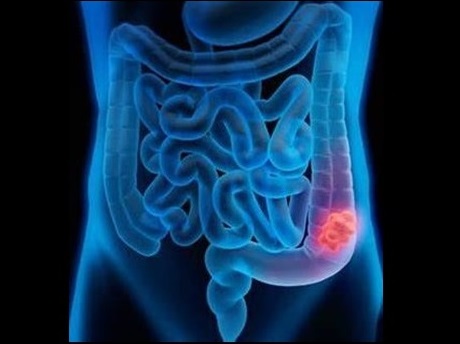By: Adebowale Bello, Freelance Health Writer. With medical review and editorial support by the Datelinehealth Africa Team

Cartoon image showing a common location of colon cancer in the large bowel.
Colorectal cancer or colon cancer is a type of cancer that affects the colon and rectum of the large bowel.
According to the World Health Organisation, it accounts for 10% of all cancer cases globally and is the second highest cause of cancer-related deaths.
Many of the individuals diagnosed with colorectal cancer are usually 50 years and above, however in recent years, the trend has changed.
Dr Christopher Cann, a gastrointestinal oncologist, explains that “one of the most pronounced younger adult cancers is colorectal cancer and persons born in the 1980s or 1990s are four times more likely to get colorectal cancer than those born in the 1950s.”
Even though experts have observed the increase in new cases of colorectal cancer, they do not know the reason why this is so, though they speculate that it may have to do with lifestyle and environmental changes.
As a precaution, it's vital to know the signs of colorectal cancer. Some of these signs may be common while few of them are uncommon.
However, you may need to pay attention to the shape of your stool.
Why is this important?
Healthy stool is usually brown, sausage-shaped and between four to
eight inches in length. It may vary in consistency ranging from being firm to soft.
However, colorectal cancer may lead to some variations in stool such as
Amongst these three variations, pencil-thin stool is the most uncommon symptom and this occurs when a tumor is located either at the end of the colon or if the tumor is present in the entire inside of the colon.
If you notice your stool getting thinner, it is advisable to contact your doctor immediately.
As a young person, you may be tempted to associate this symptom with a less serious medical condition like haemorrhoids (piles), hence it is important to undergo colorectal cancer screening.
The screening helps to detect the cancer on time or to lower your risk of the cancer. The Centers for Disease Control and Prevention recommends screening for persons aged 45 and above.
However, if you have a family history of cancer, notice changes to your stool or have blood in your stool, your doctor may advise you to get screened immediately rather than wait till you're 45 years old.
Having these symptoms does not mean that you have colorectal cancer, hence the importance of screening to confirm if it is really colorectal cancer or not.
Although it might be easier to panic in times like this, the outcome of the screening would help you know what steps to take.
So, the next time you go to the toilet, take a look at your stool and observe regularly to see if there are any changes.
In most cases, there are no changes but if you do observe changes, reach out to your doctor.
Recommended reading:
Published: April 17, 2024
© 2024. Datelinehealth Africa Inc. All rights reserved.
Permission is given to copy, use and share content for non-commercial purposes without alteration or modification and subject to attribution as to source.
DATELINEHEALTH AFRICA INC., is a digital publisher for informational and educational purposes and does not offer personal medical care and advice. If you have a medical problem needing routine or emergency attention, call your doctor or local emergency services immediately, or visit the nearest emergency room or the nearest hospital. You should consult your professional healthcare provider before starting any nutrition, diet, exercise, fitness, medical or wellness program mentioned or referenced in the DatelinehealthAfrica website. Click here for more disclaimer notice.